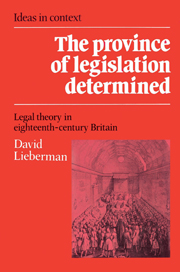Book contents
- Frontmatter
- Contents
- Preface
- Abbreviations
- Introduction
- I Blackstone and the Commentaries
- II The judiciary
- 3 Equity, principle and precedent
- 4 Legal principles and law reform
- 5 Mansfield and the commercial code
- 6 Common Law, principle and precedent
- 7 Kames, legal history and law reform
- 8 Kames and the principles of equity
- III Parliamentary statute
- IV Bentham
- Conclusion: The province of legislation determined
- Bibliography
- Index
7 - Kames, legal history and law reform
Published online by Cambridge University Press: 10 October 2009
- Frontmatter
- Contents
- Preface
- Abbreviations
- Introduction
- I Blackstone and the Commentaries
- II The judiciary
- 3 Equity, principle and precedent
- 4 Legal principles and law reform
- 5 Mansfield and the commercial code
- 6 Common Law, principle and precedent
- 7 Kames, legal history and law reform
- 8 Kames and the principles of equity
- III Parliamentary statute
- IV Bentham
- Conclusion: The province of legislation determined
- Bibliography
- Index
Summary
The legal writings of the Scottish judge and philosopher, Henry Home, Lord Kames, contain, amongst much else, one of the eighteenth century's most ambitious and articulate programs of judicial law reform. Kames's elaborate defense of the judicial route to legal improvement, as well as his more general approach to legal theory, owed much to the specifically Scottish setting in which he trained and professionally served, and no account of his career and corpus could afford to neglect this Scottish context. His inclusion provides an opportunity to relate the themes of this study to the rich corpus of Scottish social speculation which offered some of the most profound and innovative legal philosophy produced in Britain in the period preceding the appearance of Benthamic analytic jurisprudence. Nonetheless, it is perhaps best to begin with a caution against any narrowly parochial interpretation of the contribution to eighteenth-century legal speculation now under consideration.
Kames belonged to a generation of Scottish lawyers eager to create a British audience for their scholarly productions. In his most famous legal publication he urged the cultivation of a legal literature devoted “to subjects common to the law of England and Scotland,” and presented his own researches as the first steps towards the construction of a “regular institute of the common law of this island.” In the program of law reform he pressed upon the Scottish courts, he invoked Mansfield's example and expressly drew upon the tendentiously formulated lessons of English legal development.
- Type
- Chapter
- Information
- The Province of Legislation DeterminedLegal Theory in Eighteenth-Century Britain, pp. 144 - 158Publisher: Cambridge University PressPrint publication year: 1989
- 1
- Cited by



